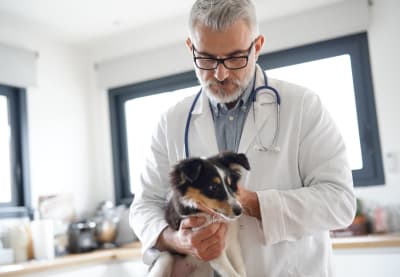Here are common dog illnesses and symptoms pup owners need to watch out for, as these can be fatal if left untreated. Our Greensboro vets provided these helpful tips.
Common Dog Illnesses
As proud dog owners, we’re constantly aware that illnesses can appear with either subtle or concerning symptoms. Here are 3 common dog illnesses and their symptoms that we often see in internal veterinary medicine.
Parvovirus
Virus particles can lurk in another dog’s feces or survive in the environment of months. Dogs and people who have not received their full slate of vaccinations are most susceptible to this highly contagious viral disease, but many dogs who receive immediate treatment can be saved.
Symptoms include:
- Fever
- Diarrhea (usually bloody)
- Weakness
- Vomiting
- Reduced appetite
- Dehydration
Puppy vaccines and booster shots can prevent your dog from contracting Parvovirus. For dogs who are afflicted, it’s imperative that they’re treated as it can lead to chronic heart diseases, bone marrow damage, bacterial pneumonia and even sudden death.
Cancer
Thanks to various vaccines, advancements in veterinary medical care, therapies and treatments, and innovative research, our four-legged friends are living longer - but we’re now seeing more incidents of certain diseases.
Various types of cancer - including soft tissue sarcomas, breast, skin, and bone cancers, and malignant lymphomas - can strike dogs as they hit old age. Though some breeds are more likely than others to suffer from cancer due to genetic factors, environmental factors can also play a role.
If little to no symptoms appear, early detection can sometimes be difficult though owners should watch for these classic signs of cancer:
- Wounds that don’t heal
- Abnormal bleeding
- Lumps or bumps
- Lameness or swelling in bones or other parts of the body
- Enlarged lymph nodes
A tumor can sometimes be surgically removed depending on the type of cancer, and there may be options to treat or cure this disease, or prolong your dog’s life. Early detection and treatment are essential to survival.
Ear Infections
Have you noticed your dog suddenly shaking their head or scratching their ear more often, or whining? Perhaps other relatively new symptoms have appeared. They could have an ear infection and need to visit a vet.
Allergies, autoimmune disorders, wax buildup, moisture in the ears (which gives yeast and bacteria opportunity to thrive), and more can potentially cause ear infections.
Here are more symptoms that may indicate an ear infection:
- Itchiness
- Pain
- Odor
- Dark discharge
- Scabs or “crustiness”
- Swelling or redness in the ear canal
Because there’s a risk of the infection reaching other parts of the ear and leading to more serious conditions such as deafness or facial paralysis, it’s imperative that ear infections be quickly treated by a vet.
What to Do If Your Dog is Ill
If any of these symptoms emerge in your dog, it’s vital that they see a vet as soon as possible. At Providence Animal Hospital, our onsite specialists, emergency clinic, and diagnostic services are ready to help diagnose and treat your pet’s most challenging illnesses and conditions.
Are you seeing signs of illness in your dog? Our veterinarians at Guilford-Jamestown in Greensboro have experience in diagnosing and treating serious conditions. Book an appointment today.
Looking for a vet in Greensboro?
We're always accepting new patients, so contact our veterinary hospital today to book your pet's first appointment.
Related Articles View All
What happens during a routine pet exam?
Routine wellness exams are a proactive way to help safeguard your pet's long-term health and vitality. Why should you take your healthy pet to the vet? What happens during a pet health wellness exam? Find out.
How much does an emergency vet visit cost?
Emergency veterinary care can be costly, but planning ahead allows you to make decisions about your pet's care based on their needs rather than financial restrictions. Today, we look at the cost of emergency vet care, and how to be ready if your pet needs emergency treatment.
Kidney Failure in Dogs
Chronic and acute kidney failure are serious health problems commonly seen in dogs. Here, you will learn about the differences between chronic and acute kidney failure in dogs, the signs to watch for and how these conditions are treated.
Signs of Bladder Infections in Dogs & How They Are Treated
Many dogs suffer from bladder infections and other issues affecting the urinary tract system. What causes bladder infection in dogs? What signs should you watch for? How do vets treat bladder infections in dogs? Read on to find out.


